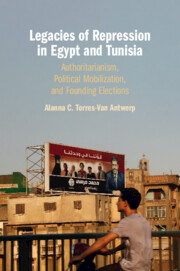 Legacies of Repression in Egypt and Tunisia
Legacies of Repression in Egypt and Tunisia Authoritarian Legacies beyond Founding Elections
from Part III - Epilogue
Published online by Cambridge University Press: 10 March 2022
In Chapter 6, we find evidence that opposition successor parties from more closed opportunity structures experience centrifugal strains caused by the amalgamation of ideological orientations and perspectives that they represent. These strains lead to elite polarization that cause movement fracture and collapse. Conversely, opposition successor parties from more open opportunity structures are ideologically more coherent and thus do not suffer the same centrifugal tensions. Second, we see that nearly all opposition successor parties experience a dramatic decline in popularity after founding elections, due the ephemerality of symbolic resources in general (oppositional credibility, in this context). The positive reputations that helped opposition groups persuade citizens to vote for them in founding elections break down under economic strain and political disfunction that so frequently plague new democracies. Finally, we see that in contexts in which authoritarian state institutions persist beyond the transition, the resurgence of state repression against opposition successor parties becomes more likely, while authoritarian successor parties, in contrast, can integrate former regime members into the new democratic political system.
To save this book to your Kindle, first ensure [email protected] is added to your Approved Personal Document E-mail List under your Personal Document Settings on the Manage Your Content and Devices page of your Amazon account. Then enter the ‘name’ part of your Kindle email address below. Find out more about saving to your Kindle.
Note you can select to save to either the @free.kindle.com or @kindle.com variations. ‘@free.kindle.com’ emails are free but can only be saved to your device when it is connected to wi-fi. ‘@kindle.com’ emails can be delivered even when you are not connected to wi-fi, but note that service fees apply.
Find out more about the Kindle Personal Document Service.
To save content items to your account, please confirm that you agree to abide by our usage policies. If this is the first time you use this feature, you will be asked to authorise Cambridge Core to connect with your account. Find out more about saving content to Dropbox.
To save content items to your account, please confirm that you agree to abide by our usage policies. If this is the first time you use this feature, you will be asked to authorise Cambridge Core to connect with your account. Find out more about saving content to Google Drive.